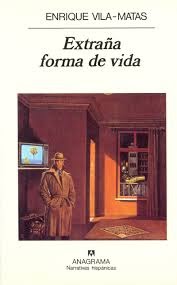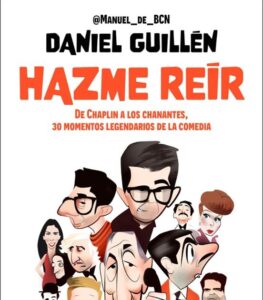
Original language: castellano
Year of publication: 1997
Valuation: Highly recommended
My knowledge of the work of Enrique Vila-Matas, in addition to being quite recent and very limited, has a somewhat particular characteristic, because it is reduced to two of his oldest novels and two of the last published. Although it is certainly not something sought on purpose, I think it allows me to establish a fairly clear differentiation between two stages separated by a relatively long interval: the first, in the 80s-90s of the last century, the second in the last seven or eight years. . It will not be a very scientific analysis of its bibliography, but it helps me evaluate the readings.
Of the two novels of the first cycle, yes Brief history of portable literature It was a compressed, accelerated and quite crazy, also very funny, sample of some resources that Vila-Matas would use in the future, in strange way of life It seems that the Barcelona author is included in a more intimate and calm text, to a certain extent more conventional. It is true that we can also contemplate some other elements that will manifest themselves later, such as the role of the writer and the dichotomy between reality and imagination, doubles or similarities as an expression of doubts about identity, the decision (or indecision) between two possible options. Always dilemmas or ways of observing, in the end perhaps a single problem of universal indefinition that begins with oneself.
As is so common, the step is marked by a character-writer, who in this case is working on a realistic text and who must prepare a conference. Suspecting that his occasional lover will attend the event and that whether he will win her back or abandon him will depend on what he exposes in public, the subject works his intervention with different approaches, depending on whether the desire to embark on a serious adventure or the desire to preserve their family stability. Based on this pendular thought, he decides to incorporate or discard successive stories, real or fictitious, whose only connection is espionage: the Portuguese man he met on the train who worked for the French secret services, the grandfather who spied on the sacred host, the father who walked attentive to the voices from underground, the double spy from Hamburg that no one knew. The same character, who analyzes his neighbors as material for his novel, also considers himself a spy, and in that identification lies the heart of the book, the writer always attentive to his surroundings, to his own or other people’s stories, authentic or invented, to images, gestures, attitudes or words that are recorded to later be reproduced or used at will.
But let’s not stay with the idea of something that may seem so serious either. This common thread of the writer-spy serves to display some of the numerous resources that Vila-Matas handles so well. With few of its usual nods to cultural figures, there is a whole exhibition of imagination that sometimes borders on political allusions or crime novel atmospheres, always with an admirable skill to mix and intertwine different textures, jumps between different scenarios and temporal spaces, until forming a constellation of small stories full of humor around that indecisive writer, who tries to incorporate them to seek the desired impact.
The line is so fine and the construction so elegant, full of subtleties, that make reading a delight, something that appears light but where, as soon as we decide to bring the magnifying glass closer, we will find hidden links, round trips in search of a path for both the artist and the person. A framework that works like a clock, and which can only be blamed for not being, or so it seems, destined to build something more solid. Maybe Vila-Matas likes these open stories, I have the feeling that this is the case, that he is more interested in letting it flow without worrying about rounding it off completely, and then you have the feeling of having enjoyed an intelligent book, very well put together, yes, although perhaps excessively and intentionally gaseous.
PS: I forgot to say that in this dichotomy between the oldest and most recent works of this author, I stick, within my limited knowledge, with the former.
Many works by Enrique Vila-Matas reviewed in ULAD: here
Source: https://unlibroaldia.blogspot.com/2024/11/enrique-vila-matas-extrana-forma-de-vida.html


